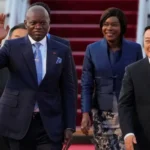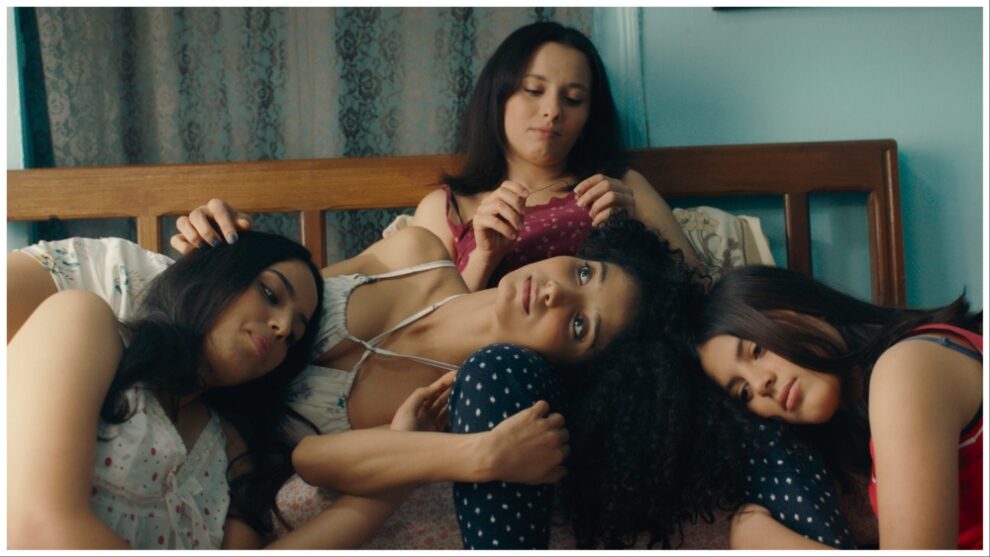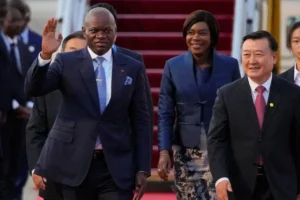Like Abbas Kiarostami’s Close-Up, Robert Greene’s Kate Plays Christine, and Nathan Fielder’s The Rehearsal, Kaouther Ben Hania’s Four Daughters takes place at the confluence of two rivers: Fiction and documentary. The subjects of this hybrid film are Olfa, a Tunisian mother of four girls, and the teenage Eya and Tayssir, the youngest two of her daughters. Ben Hania fills the gaping silhouette of the mysteriously absent other pair—Ghofrane and Rahma—with two actors (Nour Karoui and Ichraq Matar), as well as a stand-in for Olfa herself (Tunisian megastar Hend Sabri). Together, the actors (including one man, Majd Mastoura, who plays a variety of male figures in Olfa’s life) re-enact significant moments in the women’s lives in an attempt to therapeutically exorcize their grief and anger.
The film is a rehearsal with no end performance in sight, the process being the point. For an hour and 47 minutes, we’re in a bare room with the actors and their real-life counterparts, all of whom are usually clad in black—perhaps as a sign of mourning, to match the neutrality of their environment, or a mix of both. Olfa, Eya and Tayssir jockey between themselves to coach the actors in how each experienced deeply intimate moments in their lives, including Olfa’s traumatic wedding night, the verbal abuse meted out to the girls by their now-absent father every evening, and the instances of physical violence dealt to them by Olfa herself.
The result is astonishing emotional rigor, particularly from Eya and Tayssir. Forced to endure hardships both new and familiar to their mother—who unquestioningly believes one of her motherly duties is to inflict the same pain on her children that marred her own life—the girls are remarkably unafraid to hold Olfa to account. Their mother is a charismatic yet thorny figure: Hard-faced and unkind at times, yet unexpectedly vulnerable and warm at others. That emotional unpredictability is why, between Olfa, Eya and Tayssir, she alone is represented by an actor in some scenes, the pain being too close to the surface for her (and her daughters being more than ready to directly confront their mother after going through psychological therapy following their sisters’ disappearance).
The conceit at the heart of the film is a brilliant one, because it dissolves all of the interpersonal barriers that might have prevented its subjects from total honesty. Olfa’s feelings aren’t spared at all during the process, but this feels like much-needed medicine, both cathartic for the girls and sobering for their mother. Even before we learn the news-making reason for Rahma and Ghofrane’s absence—a revelation that comes late in the film—Four Daughters is a fascinating, gripping watch for the depth and candor with which it explores these women’s fraught bonds. Rather than dilute the truth, then, the use of mirrored performances has an intensifying, clarifying effect on their original subjects—one so acute that it even unnerves some of the actors.
One such moment comes when one of the girls confronts their predatory ex-stepfather (played by Mastoura) for his implied sexual abuse of her sister. Palpably disturbed by her extraordinary, courageous directness, Mastoura asks Ben Hania for a pause in filming. A similar moment of self-reflexivity comes early on, when Sabri talks to Olfa about the need for actors to wall themselves off from their roles for emotional self-preservation. At times, clever visual and aural framing also draw a symmetry between actor and subject—but other than this, these two fleeting moments are about as explicit as the film gets regarding the impact such a curious experiment must have had on its professional cast. That they don’t otherwise figure as subjects of the documentary in their own right is unfortunate because, in limiting itself to being one family’s therapeutic exercise, Four Daughters misses the opportunity to explore the ouroboros of performance—to reach the meta-heights of its groundbreaking fiction-documentary predecessors.
That said, what Four Daughters does do, it does brilliantly. Ben Hania and her subjects give us a profound live window into the cycle of trauma and, in doing so, radically trace an under-recognized path between deeply personal pain and dogmatic extremism. Gradually, we approach the reason for Ghofrane and Rahma’s disappearance: They fled the family home to join ISIS in Libya. Rather than present this as an unrelated occurrence, Ben Hania draws an insightful link between Olfa’s repression of the girls, their resulting desire for rebellion and dominance over their mother, and the opportunity to seize this domestic power that the Tunisian Revolution presented. In the context of the country’s vacuum of political power and the rise of ISIS, the girls’ classic teenaged attraction to defiance and darkness (early on, they flout their mother’s rules by meeting boys and becoming goths) mutates into something with more far-reaching and heartbreaking consequences.
So often, depictions of stories like Ghofrane and Rahma’s are informed by flattening, Othering views of Islam as inherently violent and cult-like. Ben Hania, however, perceptively recognizes that it was the girls’ repressive upbringings—which were formed less by specific religious teachings than by secular, universal human ills like misogyny and abuse—that created the tinderbox from which their lives would combust at the inauspicious touch of a spark. While it might only be patchily self-curious, Four Daughters is a rare and deeply penetrating film for the uncommonly sensitive, joined-up view of human behavior that it takes, its compelling central figure, and Eya and Tayssir’s astonishing bravery.
Source : Paste















